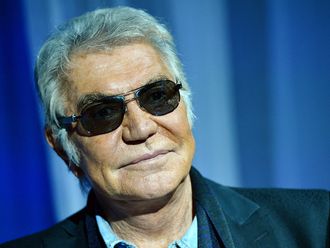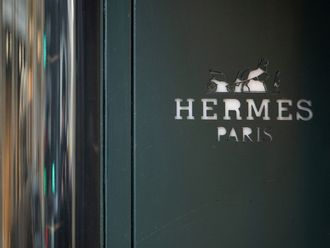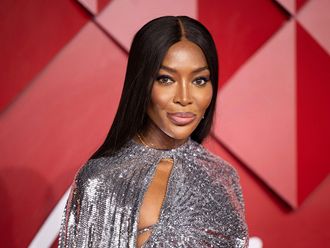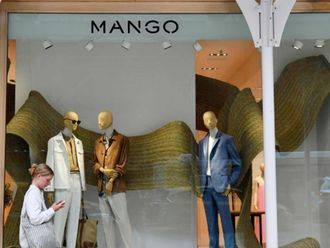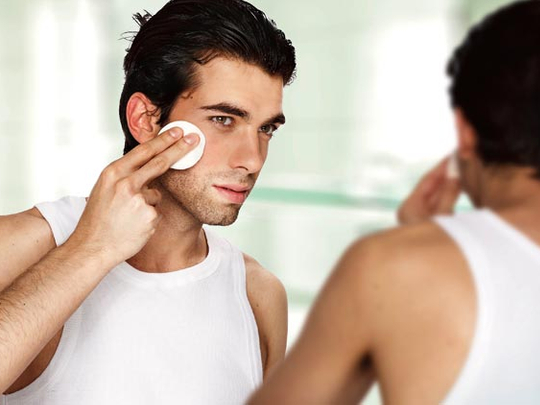
It’s a Friday afternoon and the treatment rooms at the Signature Lounge are full of clients being trimmed, tweezed and pampered to perfection. Exotic smells fill the air as trained beauticians administer facials, massages and body scrubs.
Business is booming and the spa and salon, located in the prestigious Business Central Towers in Dubai Media City, is fully booked before the weekend. What makes the Signature Lounge unusual is that it is a men’s beauty parlour.
In 2009, as the world was suffering the effects of an economic downturn, shrewd manager Manisha Thachanadan realised that the male grooming market remained surprisingly resilient.
“We started our salon during the global financial crisis and everybody thought we had gone crazy,” she says.
“People were losing their jobs and some people thought the last thing on their minds would be a massage, or a haircut, or a shave, but we have grown over the last three years and the growth continues.”
Ahead of the three-day Beauty World Middle East conference in Dubai earlier this year, industry experts revealed that spending on high-end beauty products and fragrances was growing exponentially.
According to market research company Euromonitor International, the skincare market in the UAE is expected to grow by five per cent annually and will reach Dh540 million in 2015. Furthermore, the market for premium fragrances will increase by 5.9 per cent annually to Dh334.5 million in 2014.
To cash in on the spending spree that is taking place, multinational beauty companies have developed products specifically for the region. Revlon has launched a Middle East-specific line and Ferrari has developed a traditional Middle Eastern oud fragrance catering to local tastes.
Small pleasures
Traditionally, the beauty sector has always remained robust during economic downturns as people look to simple luxuries to make them feel better in uncertain times.
Michael Dehn, Group Exhibitions Director of Beauty World’s organising company Epoc Messe Frankfurt explains: “In a downturn, sales tend to fall less, and sometimes there is growth. In an upturn, there are strong to moderate increases.” According to Michael, three of the top ten exports from the UAE to Saudi Arabia in 2010 were related to grooming.
A huge slice of growth in the region’s beauty sector is driven by the relatively new area of male grooming, which now includes everything from skincare to hair and shaving products. Despite the controversy surrounding them, skin-whitening products are also growing in popularity. In 2010 Indian beauty firm Emami launched its Fair and Handsome (FAH) range in the region. The range comprises five products including Advanced Whitening Cream and Advanced Whitening Firming Face Mask. While there is ongoing debate over the ingredients in some skin whitening products on the market, Emami is confident its range will remain popular.
Prashant Goenka, Director of International Business at Emami Limited says: “FAH is our flagship brand for the UAE and the region and it has been developed with a customised outlook for the men in the Gulf countries and the Middle East. The beauty of the brand is that it is not an implant from our home base in India, but a new formulation that takes into account the local climate and other external conditions in the region, and their impact on the male skin.”
Easy to please
Over-the-counter male beauty products have become commonplace in bathrooms across the country as men have become increasingly confident about adopting beauty regimes, which is why spas and salons such as the Signature Lounge are so profitable. They are finding that men enjoy the pampering process just as much as women.
“Men would rather pay money and come to a salon than buy products and use them at home,” says Manisha. “It is like a ritual. It is an experience. Men like to be pampered, and in many ways they are easier to please than women.
“Many of our customers are businessmen, and because of their busy lifestyles they don’t get much time to relax. When they come to us it is not just about the shave they get, it is the whole package. They are taken care of and get expert advice.”
Standard spa treatments such as shaves, haircuts and massages are popular. At the Signature Lounge popular treatments include a 60-minute massage, a full-body scrub, manicures, pedicures as well as waxing.
“We even get a lot of calls for male bikini waxes from tourists,” reveals Manisha. “But we have to explain that we don’t do that as it is against the law. We do chest waxing and when we do, the clients come out with tears in their eyes. I think male tolerance to pain is lower than women’s! We sometimes ask the men why they come to have a wax and usually it is because their wives have asked them.”
Men in the region have been identified by analysts as a huge untapped market for anti-ageing treatments. Many wealthy men even travel abroad to receive treatments from the world’s top beauty practitioners.
London-based Dr Neetu Nirdosh is one of the UK’s top anti-ageing experts. As well as administering cosmetic treatments such as Botox and fillers, her scientifically formulated anti-ageing products, which include pills and topical creams, are popular with celebrities. She also devises bespoke anti-ageing programmes for clients and has several male clients from the Middle East.
She says: “Good grooming is a sign of prosperity and in the Gulf it is important to look good. Arab men enjoy taking care of themselves.
“Botox is popular with men too. Women have been doing it for many years and men have learned from them. When they come to me they are really clued up on the science side of it. They are not scared by it. They like their frown lines and jaw lines done. The Nefertiti lift – the sculpting of the jaw line using Botox – is popular.
Men are quite specific about what they want. Anti-ageing is also huge for Arab men. Male skin is a lot thicker and so the products I ship to the Gulf for clients have higher collagen and stronger antioxidants.
“Male products also have testosterone and growth hormones. Men know the ingredients, they understand what is in a product and what it does.”
Global trends
Outside the Gulf, male grooming in Western Europe and North America is also growing but as the markets there mature, beauty companies are increasingly looking to new markets. Brazil’s male population was responsible for approximately one-third of the total male-grooming retail business between 2008 and 2011, according to Euromonitor International.
Meanwhile, in Asian markets, the male personal-care industry is also booming, driven by sales in skincare, anti-aging products and skin whitening as well as cosmetic surgery. In China, the men’s personal-care market overtook the North American market by more than $42 million (Dh154 million) in 2010, growing to more than $269 million, compared to $227 million in North America. Sales of men’s skincare products in China are expected to double the pace of growth of sales in the women’s market.
In countries such as China, Indonesia and India, increased standards of living mean men have more disposable income. They are becoming more concerned with the way they look. There are more celebrity product endorsements and high-fashion men’s magazines.
As gender barriers break down, men in many countries also take a more active role in household shopping and are more exposed to marketing campaigns and products.
There is also an important economic dimension to the rise of the image-conscious male. As white collar, service-oriented jobs increase, an attractive, well-groomed appearance can serve as a key indicator of social class.
Manisha explains: “Yes, men want to look like their idols, like George Clooney or Brad Pitt, but they also realise it is important to look good in business. Sixty per cent of our clients are CEOs and we are located in a business centre. Some people come in just before a meeting for a hair trim and a shave because they know it helps them to look presentable and smart in business.”
Rather than being indicative of a global metrosexual trend, the rise in the male grooming market may have more to do with strengthening their position in the precarious employment landscape. As businesses become more prudent in their hiring, competition in the workplace increases and physical attractiveness can give an individual an advantage. Men are beginning to find out that looking good can be the secret to success.


